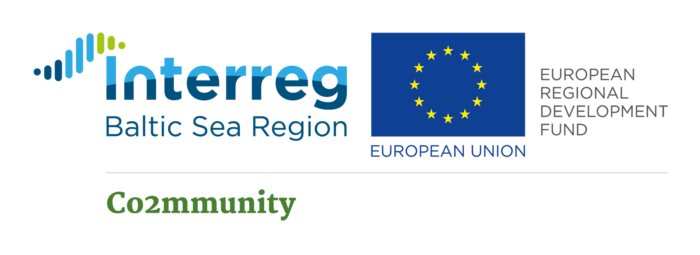Co2mmunity

The aim of the Co2mmunity project is to foster development of community energy (CE) projects based on renewable energy sources by:
- increasing the importance of community energy and cooperative energy projects in the plans and strategies of the countries in the Baltic Sea region
- strengthening the concept of cooperative energy projects in local communities
- including the concept of energy cooperative and energy cluster in national, regional and local energy strategies
- establishing international cooperation in the area of exchange of expert knowledge, integration of stakeholders and support in running community energy projects,
- promotion of community energy, social mobilization and education
- setting up “RENCOP” – renewable energy cooperative partnerships – that initiates and support community energy projects in the Baltic Sea region.
What is community energy?
Community energy (CE) projects offer enhanced production of renewable energies (RE) from local sources (wind, solar, biomass, hydropower, geothermal) through active participation of local communities. Together, citizens co-finance, co-develop, and co-operate RE plants, and foster sustainable energy distribution, like local heating networks or biogas filling stations. In Poland energy cooperatives and energy clusters are the form of the community energy projects. Through active communication, transparent decision-making, and local benefit sharing CE projects have high social acceptance. Consequently, fostering CE projects is highly promising for increasing the share of RE in the BSR.
Who benefits from our project?
No comprehensive documents about CE exist in the BSR. Co2mmunity’s objectives are to create this CE knowledge base and to enhance the institutional capacities of municipalities, institutions responsible for regional energy planning, political decision-makers, and energy and citizen’s associations for facilitating CE projects. The results of the Co2mmunity projects are:
- synthesis knowledge data base on the current CE situation in BSR with best practices, showcasing place-specificities of CE projects and success factors transferable across contexts,
- comprehensive analysis of the legislative, social and technical and economic conditions for the development of cooperative and cluster energy as a form of CE in Poland,
- tools and good practices supporting the development of energy clusters / energy cooperatives
- social mobilization for initiating and running CE projects
- energy activation at the regional and local level
- involvement of citizens in energy transformation
- social acceptance for energy clusters / energy cooperatives
- increase in the number of energy cluster projects and energy cooperatives
- long lasting knowledge base in the form of RENCOP model
What will we do?
Core to our approach are renewable energy cooperative partnerships (RENCOP) that initiate and support CE projects. In each partner region Co2mmunity will initiate and manage a RENCOP. In the project lifetime it will be established at least 8 RENCOPs: in Poland, Germany, Denmark, Sweden, Lithuania, Latvia, Estonia and Finland.
In Poland RENCOP will integrate citizens, stakeholders, members of energy cluster and energy cooperatives initiatives and projects, as well as experts, in order to identify CE local development potential, tools that will support the development of energy clusters and cooperatives but also barriers and factors slowing their development.
A transnational exchange of RENCOPs will result in a transferable RENCOP model/roadmap, enabling a transnational catch-up process between frontrunners and followers as well as enhancing the capacity of local, regional and BSR-wide actors to foster CE. Beyond this, we will develop a synthesis report on the current CE situation in the BSR, including a best practice compilation. It will showcase success factors of CE projects that are transferable across contexts. We will also develop locally specific CE handbooks and white papers for public stakeholders.